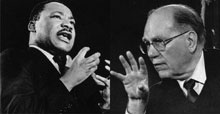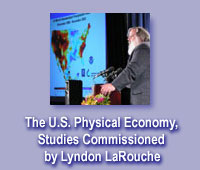|
...... ...................
|
Published: Tuesday, Apr. 19, 2005
Today is:
|
|
Volume 4, Issue Number 16
|
|
|
|
|
|
|
|
|
|
|
|
|
|
April 13, 2005
1.1 An increasing number and variety of relevant specialists have been joining an international chorus which is warning, in effect, that an ongoing, systemic economic collapse of the world's presently reigning, monetary-financial order, has now entered its terminal phase. As some leading voices in government, and relevant others, have indicated, since September 1998, the world has entered a period of historic crisis, when the time has come that nations must act in support of a common interest, to create a new financial architecture for the world at large.
1.2 Although a unified majority opinion on the design of a new permanent financial architecture, has yet to be formed among relevant authorities, certain stop-gap actions not only may, but must now be adopted and implemented, to forestall the presently threatened, irreparable damage to our physical economy. That damage is only typified by the presently accelerating crisis of the U.S. automobile
|
|
industry. Any liquidation of the present structure of the physical productive capabilities of that industry, especially its vital machine-tool sector, would mean both the end of the U.S.A. as a leading physical economic power, and related kinds of chain-reaction damage to the world economy as a whole. Emergency action to avert that outcome must be taken now.
1.3 The international complex of machine-tool-dependent physical production, as typified by the presently troubled General Motors and associated enterprises, is now at the verge of not only financial bankruptcy, but also, the threatened physical dissolution of the machine-tool and other essential and related physical-economic elements of the related, present productive capacity. This is the case, not only in North America and Europe, but the world at large. The leading implication of the ongoing financial and physical economic condition of that and related industries, is that government must now be mustered to act in accord with the implied, relevant principled, constitutional obligation of our modern nation-state. That imperative is the essential, constitutional obligation of the modern sovereign form of nation-state, to promote the general welfare, both as individual republics, and in concerted action among nations....
...pdf file, complete article
|
|
CURRENT SUBSCRIBERS:
LOG IN HERE, OR USE THE LINKS BELOW, TO ACCESS THIS ISSUE.
|
|
|
This Week in History
April 18-24, 1775
The American Revolution Begins
"In the fall of '74 and winter of '75, I was one of upwards of thirty, chiefly mechanics, who formed ourselves into a committee for the purpose of watching the movements of the British soldiers, and gaining every intelligence of the movements of the Tories. We held our meetings at the Green Dragon. We were so careful that our meetings should be kept secret, that every time we met, every person swore upon the Bible that he would not discover any of our transactions but to Messrs. Hancock, Adams, Doctors Warren, Church, and one or two more. In the winter, towards spring, we frequently took turns, two and two, to watch the soldiers, by patrolling the streets all night."
So wrote Paul Revere, describing the activities of the American patriots in British-occupied Boston during the months which led up to the battles of Lexington and Concord.
Ever since George III and the British Parliament had shut up the port of Boston and militarily occupied the city to try to force the payment of the tea tax to the bankrupt East India Company, the Americans had been expecting, and preparing for, a military confrontation. British Gen. Sir Thomas Gage, the military governor of Boston who had served in America during the French and Indian War, did not underestimate the patriots' military abilities and therefore moved carefully. But pressure from London kept building for him to challenge the Americans.
Paul Revere was instrumental in warning the patriots of Portsmouth, N.H., in December of 1774, that Gage would send a detachment to strengthen Fort William and Mary so that the local militia could not seize it. The militia acted quickly to seize the fort and empty it of all gunpowder and small arms. When George III heard of this action, he demanded that Gage punish every man involved, and seize all rebel military supplies.
Another British attempt in February to seize American military supplies in Salem ended in defeat when the patriots refused to let down the drawbridge over the North River, thus stranding the British soldiers. Revere had not been able to ride to warn the inhabitants of Salem, because he had been locked up in Castle William by the British, who rightly suspected he had been responsible for warning the Portsmouth patriots in December.
When King George's order to seize all rebel military supplies reached General Gage in the spring, he could no longer postpone a major confrontation. To prepare, he sent spies westward to Concord and Worcester, to determine how easily those American military armament depots could be taken. Concord also was the meeting site of the Massachusetts Provincial Congress, which had defied the military occupation, and continued to plan resistance and communicate with the other colonies. To make Concord even more attractive as a target, Samuel Adams and John Hancock were rumored to be staying in Lexington, on the Concord road, before they journeyed to Philadelphia as Massachusetts delegates to the Continental Congress.
One of Gage's spies, an enlisted man named John Howe who posed as a patriot gunsmith, was able to reach Worcester and report back to Boston. Howe wrote in his memoirs that the British generals asked him how many men would it take to destroy the stores in Worcester and return safely. "I said, if they should march 10,000 regulars and a train of artillery to Worcester, which is 48 miles from this place, the roads very crooked and hilly, the inhabitants generally determined to be free or die, that not one of them would get back alive." But a military expedition to closer Concord would be a very different matter, and Howe knew where the military stores were hidden.
The British government had been egging on General Gage to arrest Adams and Hancock, and could not understand why Gage had delayed so long. He had explained to them, again and again, that if he attempted to arrest two of the rebel leaders, the letter they were holding would be the last they would ever receive from him, for he would be knocked on the head. But when King George dispatched three other British generals to Boston to "help" him, Gage knew he could delay no longer. The Concord expedition was ordered, to arrest Adams and Hancock, on the way to seizing the American military supplies.
The patriot intelligence network discovered Gage's plans, and Paul Revere was dispatched by Dr. Joseph Warren, the head of patriot intelligence activities in Boston, to warn Adams and Hancock of an attempt to arrest them, and to alert Concord that it was most likely a British target. Secretly slipping out of the city on April 16, Revere was able to carry out his mission and return to Boston, unobserved by the British. The citizens of Concord moved as much of their munitions as they could to Worcester. But the patriots still did not know when the British thrust would come.
Meanwhile, Gage and the three "helpful" generals were formulating their own plans. A group of officers were selected, and sent out to create a screen on the roads to Lexington and Concord, so that no rebel express could ride through and warn the towns. The man-of-war "Somerset" was moved to the mouth of the Charles River, to command the water between Boston and Charlestown, so that rebel couriers could not cross it by boat. The patriots were looking for any sign that the British were about to move, and they soon saw many.
...more
|
|
Feature:
AN EMERGENCY RECONSTRUCTION POLICY
Recreate Our Economy!
by Lyndon H. LaRouche, Jr.
April 2, 2005
At this moment the U.S.A. is gripped by the greatest world monetary-financial crisis of more than a century. Although the U.S. economy itself has been in a process of uninterrupted decline for more than three decades, the majority of our citizens have been in a state of denial of this reality of the onrushing disaster, until most recently. Therefore, the illusion still rampant among leading institutions and the population generally, is that the presently onrushing collapse of the U.S. economy itself dates about the time of the 2001 inauguration of President George W. Bush, Jr. ...
National:
FROM LYNDON H. LAROUCHE, JR.
Emergency Action By the Senate
April 13, 2005
An increasing number and variety of relevant specialists have been joining an international chorus which is warning, in effect, that an ongoing, systemic economic collapse of the world's presently reigning, monetary-financial order, has now entered its terminal phase. As some leading voices in government, and relevant others, have indicated, since September 1998, the world has entered a period of historic crisis, when the time has come that nations must act in support of a common interest, to create a new financial architecture for the world at large.
A GOP Revolt Against Bush-Cheney Insanity
by Jeffrey Steinberg
In March, the four-year vise-grip that the Bush-Cheney White House had enforced over Congressional Republicans came to an end, when the White House demanded that $16 billion be slashed from Medicaid payments in the FY 2006 budget. Seven moderate Republican Senators joined all 44 Democrats and Independent James Jeffords (Vt.) to deliver a blow to the Administration's killer austerity schemes. And days later, it took a last-ditch White House effort to prevent a bipartisan Senate defeat of the entire Bush-Cheney budget, by convincing Sen. Susan Collins (R-Maine) not to abandon the Administration.
Is Sharon's Visit the Calm Before the Storm?
by Michele Steinberg
Israeli Prime Minister Ariel Sharon came to the U.S. April 10 with a 'wish list' which includes: a U.S. action against Iran which permanently removes any nuclear technology— including production of energy for civilian purposes; President George W. Bush's blessing for the creation of 'Greater Jerusalem,' including a massive expansion of Israeli settlements around the city; and the desire that the Admnistration begin condemning Palestinian President Abu Mazen (Mahmoud Abbas), so that after the unilateral Gaza withdrawal, Sharon could return to his insistence that Israel 'has no partner for peace negotiations.'
Physical Economy Is Only Issue in Arnieland
by Harley Schlanger
There is no question that the Schwarzenegger Project, which was launched by George Pratt Shultz in the summer of 2003, along with the recall of former California Governor Gray Davis, is in trouble. After a year of smooth sailing in office, with a fawning press contributing to favorable ratings in the polls, the kick associated with having a Hollywood action hero as Governor is rapidly diminishing.
LaRouche in Dialogue with Democrats
The Only Solution Is for Dems To Show Leadership, and Rebuild the Economy
This dialogue occurred during the question-andanswer period of the April 7, 2005 webcast given by Lyndon LaRouche in Washington, D.C. The discussion was moderated by Debra Freeman.
Economics:
Republican Budget Resolutions In Search of a Dollar Blowout
by Paul Gallagher
For a nation approaching a $750 billion annual rate of deficit in its trade and current accounts, and facing multiple warnings of the threat of a collapse of its currency, the Bush Administration's proposed U.S. Federal budget for 2006—in both its current forms as Republican Senate and House budget resolutions—is an exercise in dangerous economic incompetence.
Rebuilding Waterways Is Badly Needed, Unfunded
by Richard Freeman and Mary Jane Freeman
America's nation-wide waterways system needs an emergency mobilization to save it. Water-management—especially the inland waterways system of rivers, ports, and harbors—is, due to age and obsolescence, on the verge of breakdown, which could so severely disrupt goods transport, as to cause paralysis of the U.S. physical economy. Half of river lock and dam systems, essential to navigation are 50-90 years old, with crumbling infrastructure causing 'unscheduled unavailability'—shutdown. On an integrated series of river systems, this could prove fatal.
Italian Resolution
A Call for a New, Just Monetary System
The following resolution, which was crafted in collaboration with Lyndon LaRouche's political movement in Italy, passed the Italian Chamber of Deputies, on April 6, 2005. It was introduced by Rep. Mario Lettieri,whocited LaRouche'sNew Bretton Woods proposal in motivating the passage.
China Takes Precautions Against 'Financial AIDS'
by Mary Burdman
The debate about China's overdependence upon foreign capital and investment—its vulnerability to catching 'financial AIDS,' as EIR warned many Chinese policymakers before and after the 1997 Asian financial crisis—is a national hot topic again. The new-generation goverment in Beijing has set up a group of institutions to develop a 'scientific approach' for the future of the economy, and these discussions are certainly reflected in recent harsh warnings from some leading authorities in China's national financial system.
German Investments in Russia Reach New Phase
by Rainer Apel
The 'Week of Russian Industry' at the Hanover Industrial Fair, which began on April 10 with speeches by German Chancellor Gerhard Schro¨der and Russian President Vladimir Putin, and ended on April 16, brought considerable progress in economic relations between Germany and Russia. Among the deals signed in Hanover, the joint ventures in the railway and natural gas sectors mark a new phase in cooperation: Whereas relations in the past were predominantly characterized by Russia being the raw materials supplier and Germany the supplier of machines and other industrial equipment, now German companies are beginning to make long-term investments in Russian industry.
- Germany Must No Longer Neglect India
by Rainer Apel
During the 1950s and 1960s, even into the 1970s, German industry's engagement in India was one of its biggest in the world outside Europe. But since the 1980s, this engagement has been on a steady decline, and appeals by Indian politicians and businessmen to the Germans to get more involved, have mostly fallen upon deaf ears. Direct investment by Germany in India is ridiculously low, at about $125 million during the last few years.
India and China Agree on Set of Historic Accords
by Mary Burdman
Chinese Prime Minister Wen Jiabao called his April 9-12 visit to India 'historic,' when he spoke to the Indian press after his extensive talks with his Indian counterpart Manmohan Singh in New Delhi. On both sides, the results of trip were considered to be even better than had been expected—and Wen Jiabao had said already in November 2004 that his visit to India was the most important diplomatic event on his agenda. The agreements reached were wide-ranging, dealing with overall relations, economic cooperation, and, most crucially, the long-standing border conflict between the world's two most populous nations.
LaRouche Addresses Argentine Crisis
At his April 7 webcast, Lyndon LaRouche received two questions from listeners at a meeting in the Argentine Congress. Here are excerpts from his replies. Q: Mr. LaRouche, can you identify what other causes, besides the financial changes, that have brought the world to this current situation of crisis? LaRouche: We could say the problem is fascism. . . .
In Memoriam
Maxim Ghilan: A Fighter for Peace
by Dean Andromidas
Maxim Ghilan, a political collaborator and dear friend of the LaRouche movement for more than two decades, died on April 2 in Tel Aviv. Peace activist, author, strategic thinker, and poet, Maxim dedicated his life to bringing peace between Israel and Palestine.
Investigation:
The Christian Coalition: The Nature of the Beast
by Anton Chaitkin
"While many people are squawking about the fact of there being a religious right controlling the government, the reality is that the present government—the Bush Administration and its friends—created a pseudo-religion, like a Roman cult. And it is this religion which is being used as an instrument of tyranny by a rotten government. . . . People talk about the 'religious right.' There is no religious right. There is a state-based religion. ..."
|
|
|

EIR DVD
LaRouche: `The Immortality of Martin Luther King'
Lyndon H. LaRouche, Jr.
speaks to the Martin Luther King Day Prayer Breakfast in Talladega County, Alabama on Jan. 19, 2004
$25
Order Online
or call 1-888-EIR-3258 (toll-free)
|
|
|
|
|
|
|
|
Do you wish to change your account information?
 |
"Our Purpose is to organize people to contribute, intellectually and otherwise, to the organizing of a mass-based movement—a Gideon's Army, but with mass-base potential and actual support—to mobilize the members of Gideon's Army to study, to read, to think, to consult together, to organize together, to try to reach out and influence broader and broader layers of the population."
—Lyndon H. LaRouche, Jr. |
|
Advertisement:
Coverup Exposed!
The Israeli Attack On the USS Liberty

``The Loss of Liberty,"
a video by filmmaker Tito Howard, proves beyond any doubt that the June 8, 1967 Israeli attack against the USS Liberty, in which 34 American servicemen were killed and 171 wounded, was deliberate. The video includes testimony from Liberty survivors, many Congressional Medal of Honor winners, and from such high-ranking Americans as:
- Adm. Thomas H. Moorer,
- Adm. Arleigh Burke
- Gen. Ray Davis
- Secretary of State Dean Rusk.
Plus — a new interview with James Bamford, author of ``Body of Secrets: Anatomy of the Ultra-Secret National Security Agency.''
$25, plus $2.95 shipping and handling
53 minutes, EIRSV-2003-1
Order from EIR News Service at 1-888-347-3258 (toll-free).
Or write P.O. Box 17390, Washington, D.C.
20041-0390.
Or contact the Webmaster:
eironline@larouchepub.com
Visa and MasterCard accepted.
|
|
|
All rights reserved © 2005 EIRNS
|
Subscribe to EIR Online
For all questions regarding your subscription to EIW, or questions or comments regarding the EIW website's contents or design, please contact eironline@larouchepub.com.
Phone: 1-888-EIR-3258
|
|
|




